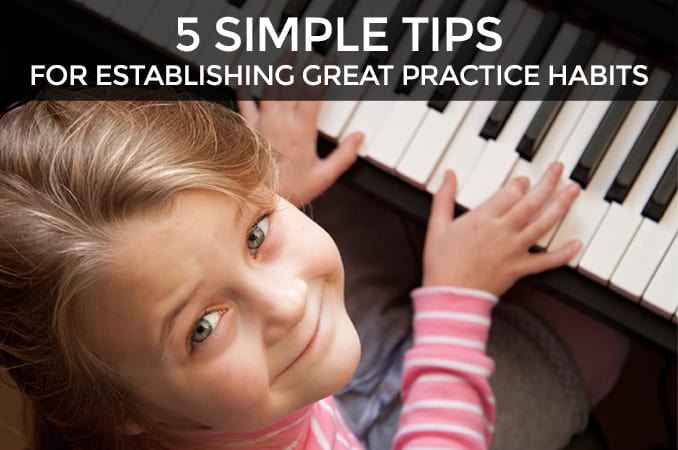Make Practice Time Rewarding and Fun with These 5 Simple Practice Tips!
When practice is rewarding and ‘fun,’ youngsters will look forward to that time spent learning their instrument, and your job as their musical mentor, supporter and cheerleader becomes all the easier!

With the new school year now fully underway, many households are getting into their groove and finding the right routine. In any musical household, one very important (yet sometimes overlooked) factor of a successful school year schedule is practice time. Following school, homework, extra-curricular activities and sleep, musical practice may occasionally get pushed to the wayside or left until the last minute, which, as we know, doesn’t really help budding musicians expand their skills and reach their goals.
We’ve narrowed down five simple tips for encouraging good practice habits that children can carry on throughout their musical careers. When practice is rewarding and ‘fun,’ youngsters will look forward to that time spent learning their instrument, and your job as their musical mentor, supporter and cheerleader becomes all the easier!
1. Keep a consistent practice time.
Unlike other after-school or extra-curricular activities, your child is responsible for his or her own music practice routine. There’s not a coach or teacher sitting down with them every day making sure they’re practicing. This is a great lesson in responsibility, and there certainly are little ways you can help guide them into good habits.
If your child is in private music lessons, a teacher will most likely be happy to provide you a practice schedule based on the student’s age and ability. Ensuring they get that practice in is up to the student, though! One easy, yet essential, tip to implement is keeping a consistent time to practice. Tailor that non-negotiable practice time to your child, for example, if they wake bright eyed and ready to go, set practice in the mornings. Likewise, if your child is most alert and focused right after dinner, incorporate practice into your nightly routine. Just be sure that he or she is able to fully focus at that time and that the family (yourself included) will be able to commit daily.
If circumstances arise making practice difficult during your normal time once in a while, still try to have your budding musician sit down for at least 5 minutes to concentrate on his or her music. Consistency is everything, and your child will begin to recognize practice as an important segment of their day.
2. Set and write down measurable, attainable goals.
This goes hand-in-hand with the previous practice tip. We like to measure the appropriate duration of each practice in goals, not minutes. Have your child write down his/her specific goals for each practice session, and allow him or her to cross off those goals once accomplished. Be sure each goal is measurable, for example instead of saying “I want to memorize ‘Mary Had a Little Lamb,'” the goal might be “I want to play through ‘Mary Had a Little Lamb,” without looking at the keyboard.” (Click here to download a FREE Beginner Notes arrangement of “Mary Had a Little Lamb.”)
Also, don’t set too simple of goals, but be sure to set attainable goals. Some goals may span multiple sessions, and that’s absolutely fine. But, more than a week, and the musician-in-the-making will likely get discouraged. Be sure the goals they’re setting for themselves are realistic.
Your child is sure to beam with pride after completing their daily to-dos, and that extra confidence will make him or her excited to show those new skills off to siblings or friends.
3. Make it a family/friendly affair.
A really simple way to get a child excited about his or her music is for you to show your own excitement. Sit down for at least part of practice time, have your child explain to you what their goals are and how they’re going to work to accomplish them, while you provide enthusiastic encouragement. Hold mini ‘recitals’ at your house, when your child can invite his/her siblings or a couple of friends to hear a new piece or skill learned. This will additionally encourage your mini-musician to become familiar with performing in front of others.
4. Make practice “fun.”
“Fun” is in quotations purposefully. Practice is work, and should be recognized as such. In order for your child to successfully continue their musicianship, it’s essential for him or her to understand that not every practice will necessarily be “fun,” nor should it be.
However, practice should always be engaging and, thus, entertaining. Progress will be your child’s greatest motivator, and crossing off those goals is a fantastic discernible indicator of how far their hard work has gotten them!
It doesn’t hurt to throw in a bit of good, old-fashioned “fun” every now and again either. After their scales and exercises are done for the day, let you child spend time making up a song or his/her own or sing silly lyrics along with a piece they’re working on. Have them play really slowly, then see how fast they can play. Again, your excitement will translate into their own excitement.
5. Use rewards when appropriate.
Your encouragement and their own sense of accomplishment will serve as excellent motivating factors in establishing great practice habits, but a reward every now and again sure doesn’t hurt. If your little Liszt just completed one of those week-long type goals and you’re especially impressed by the dedication they’ve shown, celebrate their accomplishment with a special treat.
A few reward ideas ranging in scale include taking your child to a concert featuring the instrument they’re learning, showing them a particularly inspiring YouTube video of a musical master or offering them a new sheet music piece of their choice. We have today’s most popular pop, movie, Broadway and holiday titles for every skill level. Whether they’re just starting out with Beginner Notes or have graduated to Easy Piano arrangements, you’re most likely to find the exact piece that they’ve been excited to learn.

